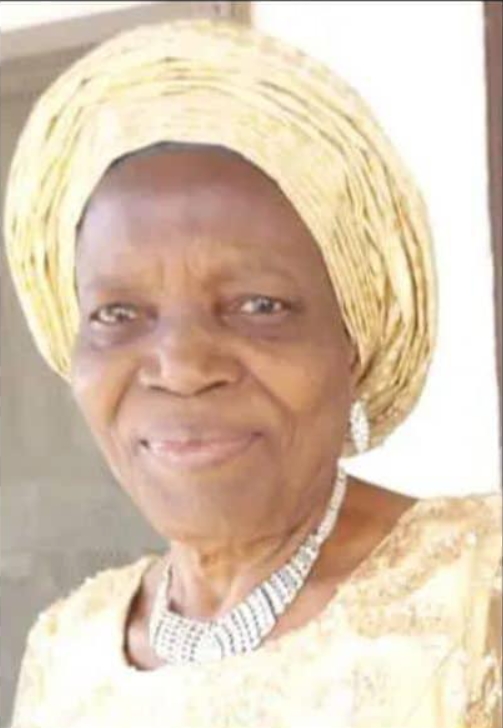Maritime Agencies
BRT-TRAIN COLLISION: CILT Mourns, Tasks Government To Streamline Rail and Road Infrastructure.
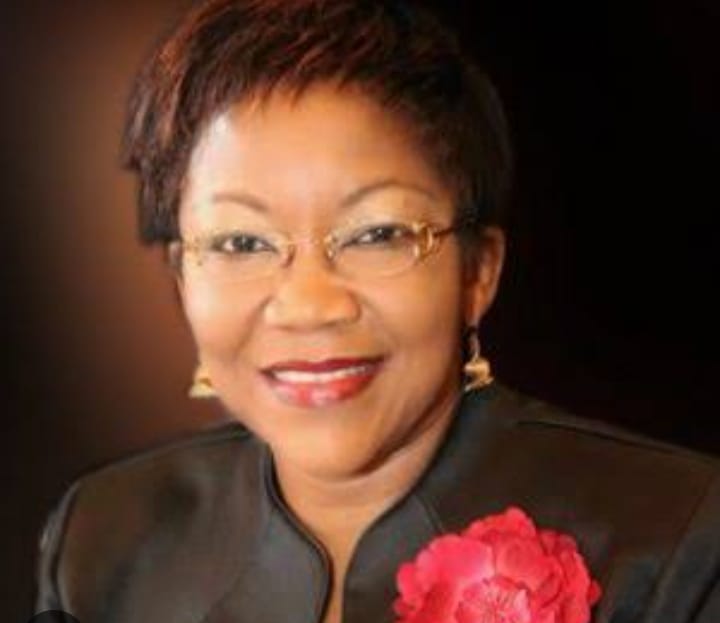
By Izuchukwu Ozoemena
The Chartered Institute of Logistics and Transport of Nigeria (CILTN) has stated that in line with international best practices, it is compulsory that the Nigerian Railway Corporation (NRC) provides and maintains rail-specific infrastructure such as barriers, gate houses, rails and level crossings with adequate signage and audio warnings to alert motor vehicles on the approach of locomotives especially at intersections.
Road transport infrastructure, it says,
are designed, constructed and maintained by a public service system separate from the Nigerian Railway Corporation (NRC) which owns and maintains rail tracks and operates the trains. Therefore, some level of delineation measures must be on ground to avoid collision and loss of lives.
CILTN President, Barr Mrs Mfon Usoro stated this while commiserating with the families of victims of the BRT-train collision in Ikeja, Thursday, which claimed six lives with many passengers suffering various degrees of injury.
To forestall such occurrence, going forward, CILTN recommends a clear demarcation of responsibilities and efficient coordination between the road authority and the rail authority in managing intersections in the short term.
“The party responsible for funding safe operations of the rail infrastructure should be revisited. The present system of shared financial responsibility for the provision, manning and maintenance of the safety of infrastructure at intersections, CILTN observed, appears cumbersome and leaves room for lack of accountability.
It called for proper delineation of roles and adequate budgetary funding for the Nigerian Railway Corporation.
“There are minimum safe distances that must be observed at stops and intersections. A train requires a minimum of 320m adequate distance (safety over-run). This implies that to stop a train in motion, the driver must apply the brake about 320m to the stop point.”
“Level crossings are essential safety infrastructure for the free flow of transportation where there are intersections between two or more modes of transport”, CILTN stated.
The Institute said it is extremely difficult to successfully manoeuvre and stop a train in motion with shorter safety over-run.
This makes it necessary to install functional and well-manned road safety infrastructure at specific points and intersections. These barrier include road bumps, speed retarders, etc. In addition, law enforcement agents should be stationed at the level crossings to compliment the work of gate keepers.
CILTN called for aggressive safety awareness campaigns by relevant agencies such as the Federal Road Safety Commission (FRSC) and State traffic agencies to educate commuters on safety on the road and rail.
As a long term measure, CILTN suggested, number of intersections should be reduced even as separate routes for rail tracks and roads is encouraged.
“New constructions should, as far as is practicable, not include intersections in designs. Flyovers or tunnels are preferred options.”
Mrs Usoro commended the Federal Government for empanelling with despatch an investigation into the Ikeja train crash.
“The CILT re-iterates its call for the Government to set up an independent body that will be tasked with investigation of all transport-related accidents as recommended in the National Transport Policy. It is not best practice to expect the agencies directly or indirectly involved in accidents to investigate themselves.”
Expressing concerns about the delay in birthing the proposed National Transport Commission and the National Transport Safety Board, CITLN urged the Transportation Minister to submit the National Transport Policy to the FEC for approval.
The Chartered Institute of Logistics and Transport (CILT) is the world’s leading international professional body for all sectors of the Logistics and Transport Industry. CILT provides authoritative views on systems and policies relating to Logistics and Transport for government and industry. It parades highly knowledgeable, skilled and experienced professionals capable of enhancing efficiency in the transport sector applying best global practices.
Maritime Agencies
NAGAFF Pledges Watertight Enforcement, Unveils A More Formidable 100% Compliance Team.
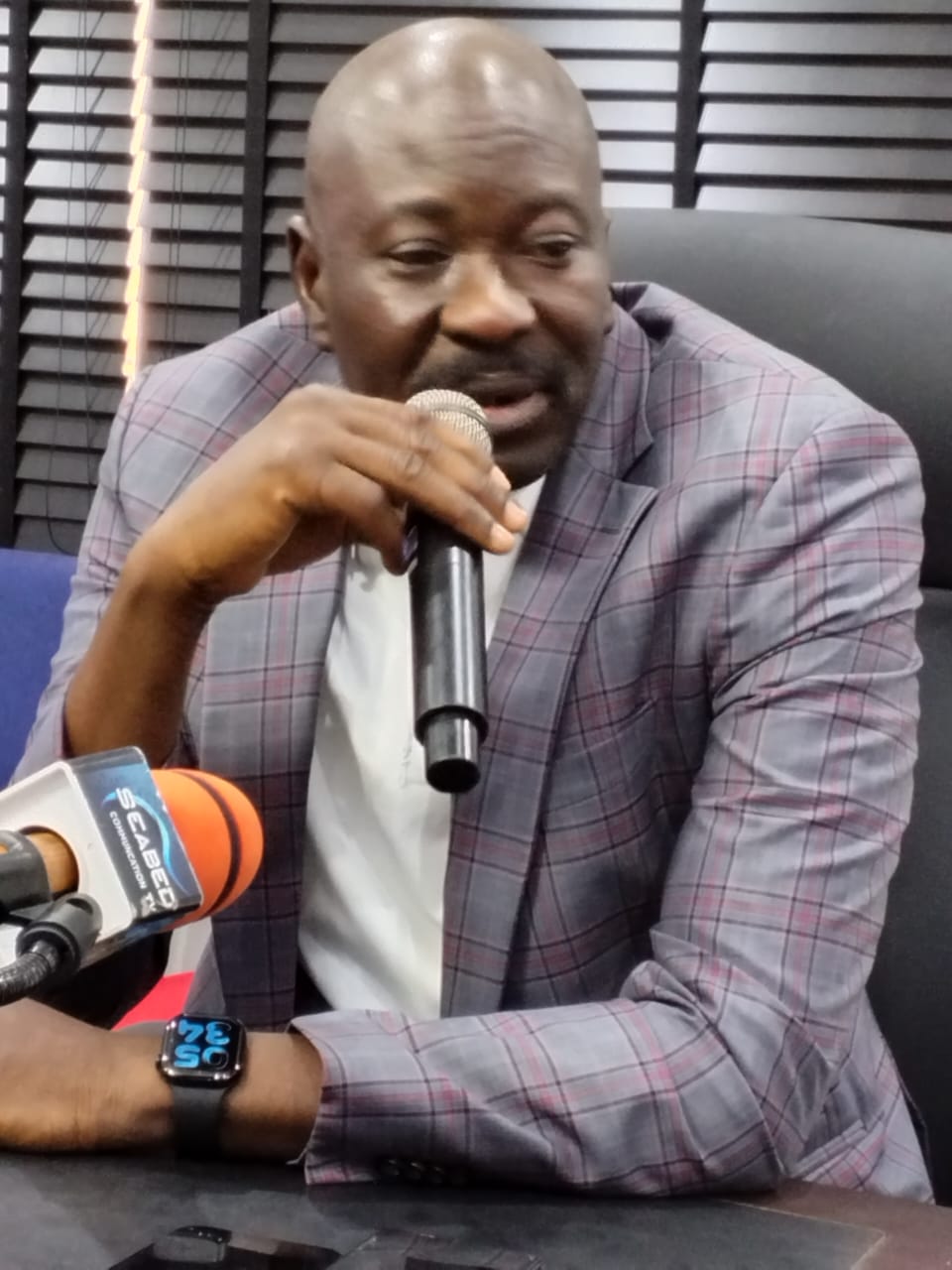
By Izuchukwu Ozoemena
The 100% Compliance Team of the National Association of Government Approved Freight Forwarders (NAGAFF) which appeared inactive for over six months is now reformed and better focused to perform her duties strictly in line with her mandate.
The Team Coordinator, Alhaji Ibrahim Tanko, disclosed this in Lagos, Friday, during the official unveiling of a new office complex at Eleganza Plaza, Apapa.
“Today, we commission the new secretariat of the 100% Compliance Team and we are ready to take this Team to a higher pedestal”.
He said that for over six months, the interventionist outfit went into some kind of hibernation to take a comprehensive review of internal issues especially concerning her operations and the overall conduct of her operatives with a view to performing better.
”From today”, he pledged, “you will start seeing the effects of a new Compliance
Team”.
On stakeholder concerns that some operatives of the Team do not live above board in their conduct even as it is said that he who goes for equity must come with clean hands, Tanko said among every twelve, there must be a Judas.
On the question of discipline, every society is made up of the good, the bad and the ugly, he posited
”We are doing everything possible to sanitise the system and to continue to maintain discipline”.
Tanko who promised that the Team is now ready to build into the training programme of the NAGAFF Academy said as part of the rebirth now unveiled, Customs Area Commands are now to support regular refresher courses for freight forwarders especially in the aspect of classification. He assured that going forward, the Team’s programmes and activities are to benefit from full digitalization.
He announced that the Team is set to acquire a new office in Port Harcourt which it plans to open come February. “We are working hand- in-hand with the Economic and financial Crimes Commission (EFCC) and the Independent Anti-Corruption Practices Commission (ICPC) to make Nigeria stronger. We shall also expand this new place to accommodate the TDI that will also hopefully open in February.”
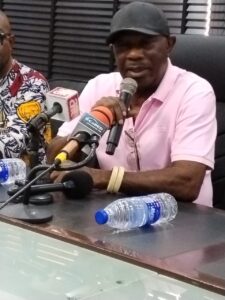
Dr Boniface Aniebomam, NAGAFF Founder
Earlier in his post-inauguration remarks, NAGAFF Founder, Dr Boniface Okechukwu Aniebonam extolled the willingness of NAGAFF leaders to add value, describing it as the driving force behind the association. Those running the Compliance Team, he cautioned, must understand the limit of their position. “The saying ‘See something, say something’ is very observatory.”
” Do note that the Port is a Customs Port. If Customs has not released your cargo, do not make trouble until it is done; if it is released on the ground of expediency, also remember that other sister agencies are also there to intervene. The NAGAFF approach is centred on dialogue, communication, diplomacy and discussion.
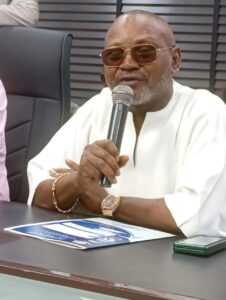
Chief Tochukwu Ezisi, NAGAFF National President
NAGAFF President, Chief Tochukwu Ezisi recalled that when the NAGAFF 100% Compliance Team was inaugurated four years ago, the industry was at crossroads. There were compliance gaps, procedural inconsistencies even as operational shortcuts worked against efficiency and operational trust.
”Many wondered whether a single team could truly shift the culture of an entire industry.”
He said with the birth of the Compliance Team, the level of regulatory compliance among freight forwarders nationwide went up while infractions, delays, penalties and operational setbacks took the back seat.
He explained that strengthened collaboration with key government agencies, especially the
Nigeria Customs Service, promoted ethical conduct and professionalism and has contributed significantly to improved revenue assurance for the Federal
Government.
The Compliance Team has equally enhanced the reputation of NAGAFF as a responsible, forward-thinking, and compliance-driven organization.
Chief Ezisi set ambitious targets for the repositioned NAGAFF 100% Compliance Team to include full Digital Compliance Integration as the goal is to become the most digitally-compliant freight forwarding body in Nigeria.
The group is also out to reduce compliance infractions by 60% within two years through training, monitoring and proactive engagement even as institutional collaboration is enhanced.
”We must deepen our partnership with Customs, NPA, SON, NAFDAC, and other regulators to promote transparency, fairness, and predictability in port operations.
NAGAFF will also establish a National Compliance Intelligence Network to help detect detect risks early, identify patterns of malpractice, and protect members from avoidable pitfalls.
Customs
PTML Customs Hands Over Seized Arms and Ammunition, Collects N44.06bn in January.
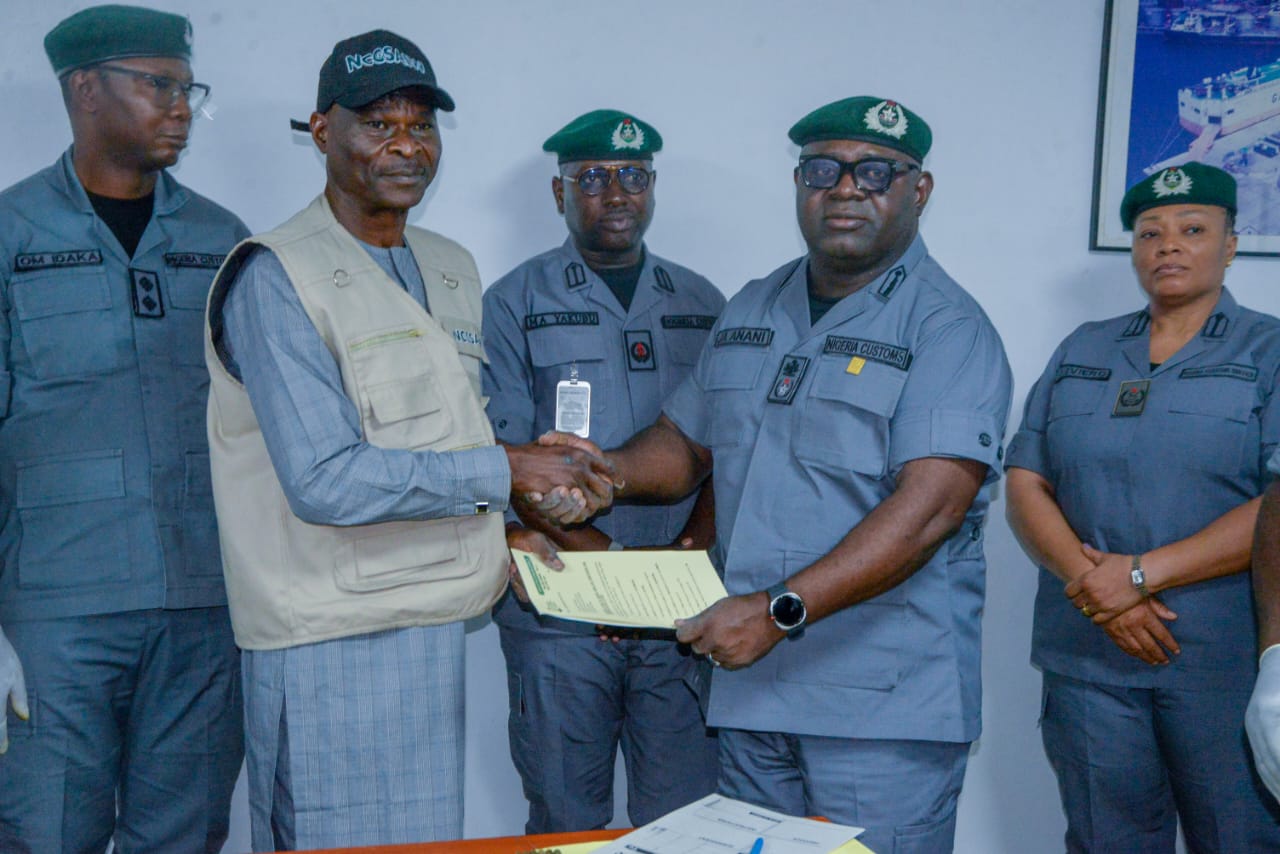
By Izuchukwu Ozoemena
For the umpteenth time, the Ports Terminal Multi-services Limited (PTML) Command of the Nigeria Customs Service has made it clear that it remains a no-go area for unlawful trade under any guise.
As a Command, the PTML Customs has an unshaken commitment to implement the Revised Kyoto Convention, which is a World Customs Organisation (WCO) instrument for trade facilitation while using available manpower and technology to exercise the required control for import and export trade.
The Customs Area Controller, Comptroller Joe Anani stated this at the Command Headquarters in Apapa, Friday, while handing-over seized arms and ammunition to the National Centre for the Control of Small Arms and Light Weapons (NCCSALW).
The seizures consist of five (5) pistols of different makes, one (1) Crossman pump master rifle, 132 Remington live cartridges, 51 9 mm Lugar live ammunition and four (4) 9mm magazines.
Others were forty (40) 9mm, NIM FC 30-30 blank and hollow ammunition and one hundred and eighteen (118) of 9mm empty shells.
”These arms and ammunition were uncovered in 25 different occasions by our officers during the examination of imported vehicles between 2022 to 2025.”
”These seizures are a fallout of the collective due diligence of the Command and other sister agencies in the port.”
The handing-over, he explained, follows the approval of the Comptroller General of Customs, Bashir Adewale Adeniyi, MFR psc(+).
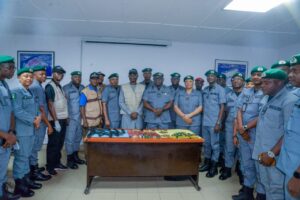
Present at the event was the South- West Coordinator, National Center for the Control of Small Arms and Light Weapons (NCCSALW) and his entourage. Others were the Management of Port and Terminal Multi-services Limited, sectional heads and heads of other sister agencies.
He explained that under the NCS Modernisation Project which was pioneered by the PTML Command, the Unified Customs Management System (UCMS), also known as B’Odogwu, has raised the bar for productivity.
”I am pleased to announce that this Command will receive scanners soon as part of the modernisation project and our capacity to detect concealments, like these arms and ammunition would be greatly enhanced.”
Appreciating the Command’s compliant stakeholders for their cooperation at all times, he described them as l part of the Command’s success story.
The CAC announced that two days to the end of January, 2026, the PTML Command collected a total revenue of ₦44,058,849,416.65. This figure surpasses N40,497,594,223.89 realized in January, 2025 by N3,561,255,192.76, marking an 8.8% increase in revenue.
On behalf of the CGC, Comptroller Joe Anani formally handed over the seizures to the National Center for the Control of Small Arms and Light Weapons (NCCSALW) for appropriate action.
Maritime Agencies
WAR AGAINST KILLER DRUGS: Apapa Customs, NDLEA Collaborate To Nab Huge Quantity of ‘Canadian Loud’.
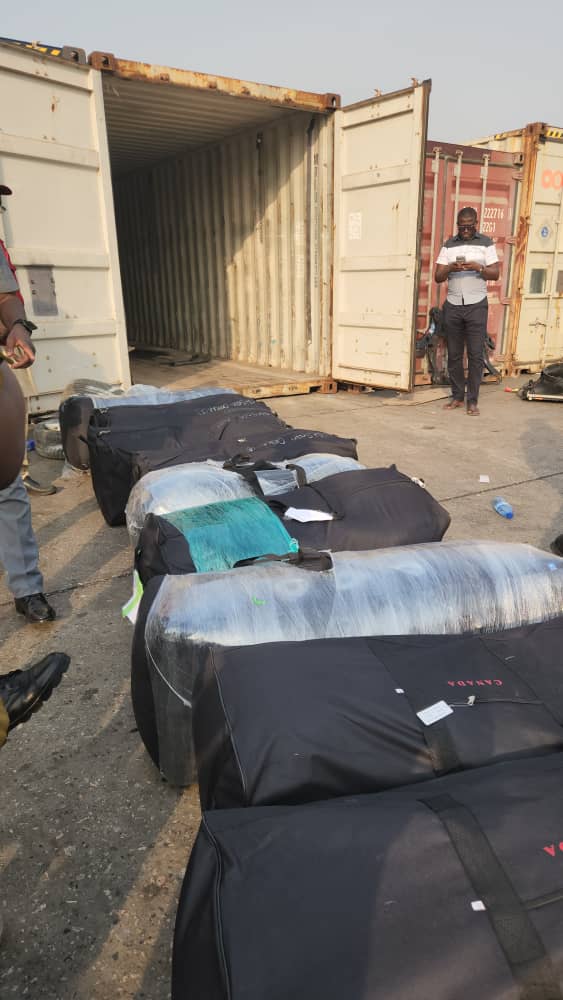
By Izuchukwu Ozoemena
In her unwavering efforts to ensure that killer – drugs do not find entry into Nigeria, the Apapa Command of the Nigeria Customs Service has, in liaison with the National Drug Law Enforcement Agency (NDLEA), intercepted a 347.5 kilograms of ‘Canadian Loud’ concealed in an imported Toyota Sienna car. The highly – valued substance is a potent strain of cannabis, ordinarily known as marijuana.
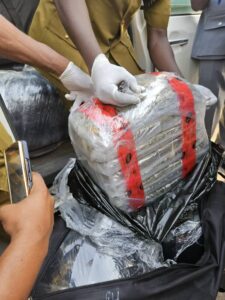
As stated in a press release by CSC Isah Suleiman, the Apapa Customs Command Public Relations Officer, the contraband hidden in 13 bags within one of four vehicles contained in a single consignment was discovered following a painstaking weighing exercise. A breakdown shows ten bags at 25kg each, one at 29kg, and two at 34.5kg and 34kg respectively, totaling 347.5kg.

This interception marks the fourth major joint drug bust by the Nigeria Customs, Apapa Command and the NDLEA in less than two months.
In his remarks, the Apapa Customs Area Controller, Comptroller Emmanuel Oshoba re-enacted his warning to criminal elements and their networks to keep off the Command as the Command is always ahead of them to exploit whatever antics they deploy to undermine national security via the ports.
“Any attempt by criminal elements to traffic prohibited items through Apapa Port will be detected and thwarted. We remain vigilant and resolute in the discharge of our duty to protect our society and national security.”
He emphasized that under his watch, no cargo, whether import or export will pass through Apapa Port without thorough examination.
The operation also reflects the exemplary cooperation between Customs and NDLEA, championed by the Comptroller General of Customs, Bashir Adewale Adeniyi MFR, PhD. Intelligence sharing and joint tactical efforts have consistently outmaneuvered smuggling networks in Nigeria’s maritime sector.
Oshoba credited this strengthened partnership for the success, noting that the upcoming deployment of a high-capacity drive-through scanner capable of processing 200 containers per hour will further revolutionize anti-smuggling operations.
Both agencies continue to operate under strict Standard Operating Procedures (SOPs) that foster zero tolerance, professionalism, and seamless cooperation. In line with established protocols, the seized cannabis has been formally handed over to the NDLEA for further investigation and prosecution of suspects linked to the consignment.
This latest success builds on the recognition accorded to Comptroller Oshoba and NDLEA Apapa Special Area Commander Mohammed Tukur, who were both awarded the WCO Certificate of Merit on January 26, 2026, in Abuja during the International Customs Day celebrations.
Oshoba further explained that the interception aligns with the 2026 ICD theme: “Customs Protecting Society Through Vigilance and Commitment.”
While Customs remains committed to facilitating legitimate trade, the CAC reaffirmed, it will intensify efforts to disrupt illicit activities and safeguard society.
-

 Customs2 weeks ago
Customs2 weeks agoFG Inaugurates Nigerian Shippers’ Council Board, Highlights Need for Reduced Port Costs, Fair Pricing.
-

 Maritime Agencies2 weeks ago
Maritime Agencies2 weeks agoSuspend Charges Review, Engage Stakeholders, Shippers’ Council Tasks Shipping Companies
-
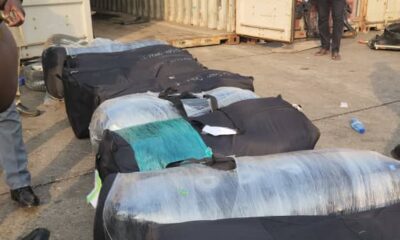
 Maritime Agencies6 days ago
Maritime Agencies6 days agoWAR AGAINST KILLER DRUGS: Apapa Customs, NDLEA Collaborate To Nab Huge Quantity of ‘Canadian Loud’.
-

 Customs1 week ago
Customs1 week agoKLT Customs Surpasses 2025 Revenue Target By a Wide Margin, Clamps Down on Expired Imports.
-

 Maritime Agencies1 week ago
Maritime Agencies1 week agoOGUN AREA 1 CUSTOMS: Suspected Armed Drug Traffickers Mount Barricades, Attack Officers. Two Personnel Critically Injured.
-
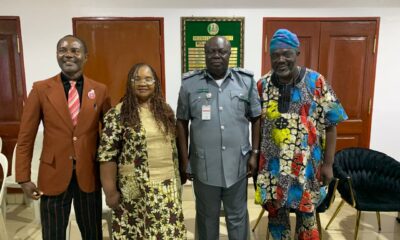
 Maritime Agencies1 week ago
Maritime Agencies1 week agoSeme Customs Raids Hideouts, Impounds 200 Bags of Smuggled Rice, Collects N2bn 3 Weeks into 2026.
-

 Customs1 week ago
Customs1 week agoLekki Deepsea Port: The Success Story of the Nigerian Ports Authority.
-
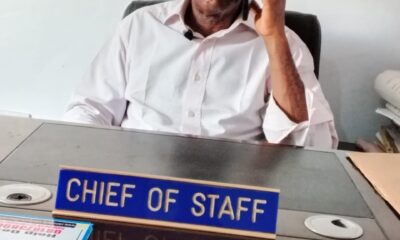
 Maritime Agencies6 days ago
Maritime Agencies6 days agoNAGAFF Compliance Team Set to Relaunch for Stronger Engagement, Enforcement.


























